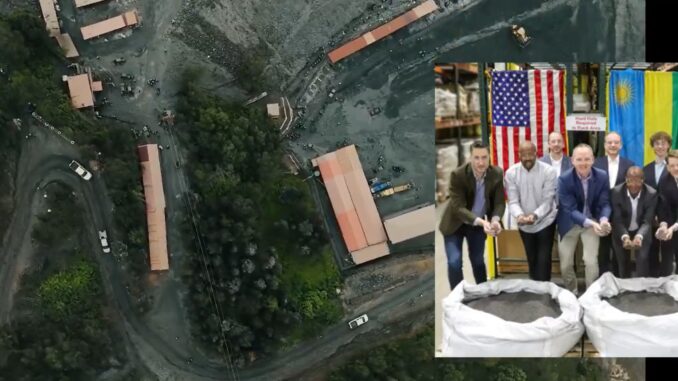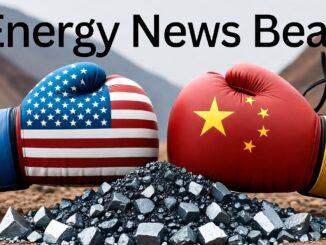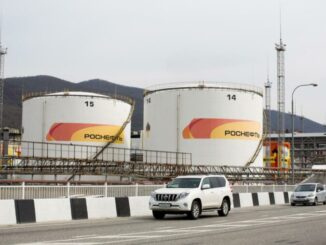
In a significant step toward securing America’s supply chains and reducing reliance on foreign adversaries, the United States has received its first direct shipment of tungsten concentrate from Rwanda. This milestone, achieved through a partnership between Rwandan mining firm Trinity Metals and U.S.-based Global Tungsten and Powders (GTP), marks a deliberate effort to diversify sources of critical minerals away from China’s overwhelming dominance in the global market.
Tungsten, essential for applications in defense, aerospace, electronics, and energy sectors due to its high melting point and durability, has long been a vulnerability in U.S. supply chains, with China controlling approximately 83% of global production.
The shipment, sourced from Trinity Metals’ Nyakabingo mine in Rwanda, arrived at GTP’s facility in Towanda, Pennsylvania, on September 30, 2025.
The United States has begun receiving shipments of tungsten, a critical rare-earth mineral, straight from Rwanda for the first time.
This is a major milestone for the Trump White House in their push to dismantle China’s power over America’s mineral supply chain.
“It is an honor… pic.twitter.com/TvomcQAwJV
— George (@BehizyTweets) October 7, 2025
This direct route bypasses traditional intermediary channels often routed through Asia, streamlining logistics and enhancing security of supply.
Senior officials from Trinity Metals, GTP (a subsidiary of the Austrian Plansee Group), and commodities trader Traxys celebrated the arrival alongside the U.S. Ambassador to Rwanda.
Trinity Metals Chairman Shawn McCormick highlighted the benefits, stating that the deal not only bolsters U.S. prosperity and safety but also supports nearly 7,000 jobs in Rwanda while deepening bilateral ties. Rwanda, Africa’s largest tungsten producer and the fourth-largest globally, has positioned itself as a key ally in this shift.
Do you have a Tax Burden in 2025?
The country’s mining sector has seen substantial investment, with Trinity Metals operating multiple sites and emphasizing sustainable practices. This partnership aligns with broader geopolitical strategies, including recent peace efforts in the region that may facilitate greater resource access.
Trump Administration’s Push to Bolster Critical Minerals
This tungsten deal is a direct outcome of the Trump administration’s aggressive policies to revitalize U.S. mineral independence. In March 2025, President Trump issued an executive order mandating immediate measures to increase domestic mineral production, emphasizing job creation and reducing dependence on foreign nations.
The order builds on earlier actions, including a 2019 government-wide plan to curb reliance on adversaries like China for critical minerals.
Key initiatives include:Tariffs and Trade Tools: Expanding Section 232 tariffs on steel and aluminum to 50% and 25%, respectively, to protect domestic industries and encourage alternative sourcing.
Price Supports and Funding: Extending federal price guarantees for rare earth projects and fostering interagency coordination for energy and mineral funding.
International Partnerships: Investing in allied nations’ mining projects, such as stakes in Canadian and Australian firms, to secure supplies of lithium, copper, and other essentials.
Domestic Projects: Approving infrastructure like the Ambler Road in Alaska to unlock vast deposits of copper, zinc, and other critical minerals.
These efforts address national security concerns, as China’s control over minerals like tungsten has been weaponized in trade disputes. The administration’s strategy also explores innovative technologies, such as direct lithium extraction and biomining, to further erode China’s grip.
Investment Opportunities in Involved Companies and the Sector
While the Rwanda-U.S. tungsten deal involves primarily private entities—Trinity Metals (a privately held Rwandan firm with recent grants but no public stock) and GTP (a subsidiary of the privately owned Plansee Group)—it spotlights broader investment prospects in the critical minerals space, especially those backed by Trump administration initiatives.
Publicly traded companies benefiting from U.S. government support include:
|
Company
|
Ticker
|
Focus
|
Recent Developments
|
|---|---|---|---|
|
MP Materials
|
MP (NYSE)
|
Rare Earths
|
U.S. government acquired a stake; operates the only U.S. rare earth mine; stock surged on policy support. cnbc.com
|
|
Lithium Americas
|
LAC (NYSE)
|
Lithium
|
Received federal equity investment for Thacker Pass project; aims to reduce China dependency in EV batteries. fidelity.com
|
|
Critical Metals Corp.
|
CRML (NASDAQ)
|
Rare Earths (Greenland)
|
In talks for U.S. stake; stock soared on news; focuses on Greenland’s mineral wealth. |
|
Almonty Industries
|
AII (TSX)
|
Tungsten
|
GTP holds significant shares; developing tungsten mines in Spain, Korea, and Portugal; positioned to benefit from diversified supply chains. finance.yahoo.com
|
|
Trilogy Metals
|
TMQ (NYSE American)
|
Copper/Zinc (Alaska)
|
U.S. investment of $35.6M for Upper Kobuk Mineral Projects; tied to Ambler Road approval. reuters.com
|
These stocks have seen volatility but gains amid administration actions, with investors betting on further federal involvement.
Exchange-traded funds (ETFs) like the Sprott Junior Uranium Miners ETF (URNJ) or Global X Lithium & Battery Tech ETF (LIT) offer diversified exposure to the sector. However, risks include regulatory hurdles, commodity price fluctuations, and geopolitical tensions. Investors should conduct due diligence, as the administration’s pivot to equity stakes signals long-term commitment but doesn’t guarantee returns.
This tungsten shipment from Rwanda exemplifies how strategic alliances and bold policy can reshape global energy and mineral dynamics, paving the way for a more resilient U.S. economy. As the Trump administration continues its push, the critical minerals sector remains a hotbed for innovation and investment.
Do you have a Tax Burden in 2025?
Crude Oil, LNG, Jet Fuel price quote
ENB Top News
ENB
Energy Dashboard
ENB Podcast
ENB Substack






